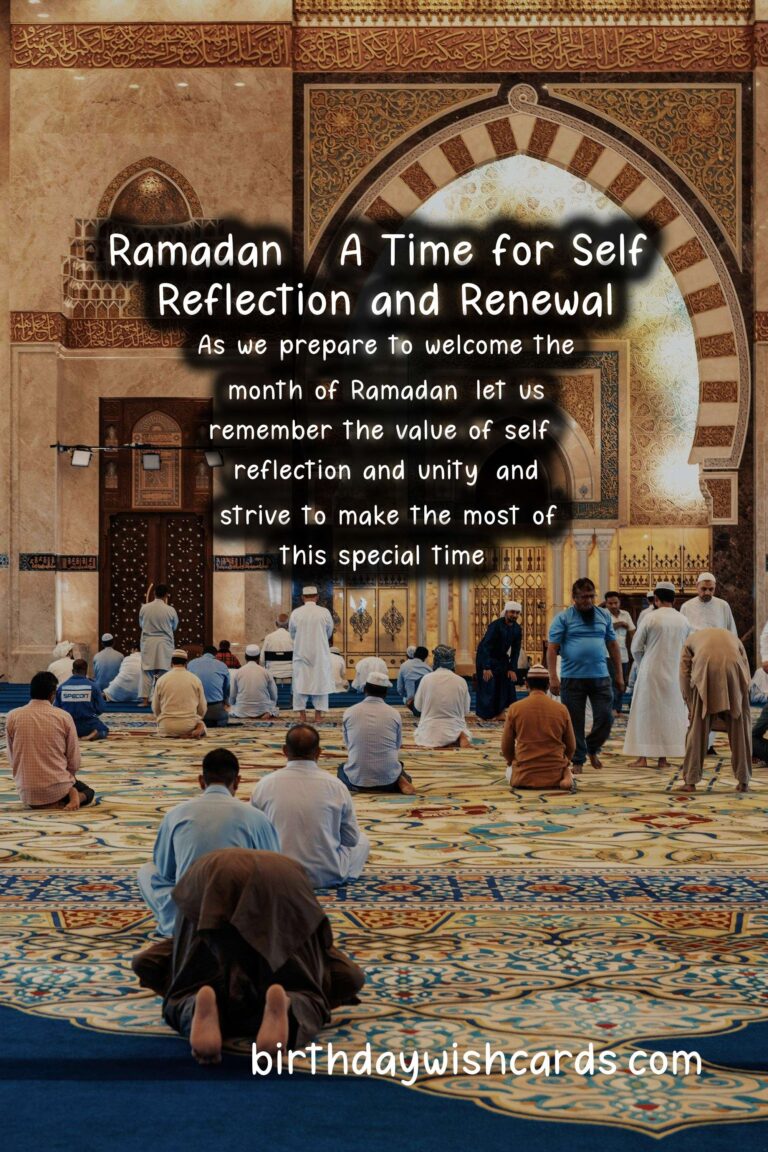 Ramadan, also known as the Holy month of fasting, is a significant time for the Muslim community around the world. It is observed during the ninth month of the Islamic calendar, which follows a lunar cycle and varies each year. This allows Muslims to experience Ramadan at different times of the year, adding to the diversity and beauty of the religion. Ramadan is a time for spiritual and physical purification, a time to strengthen one’s faith and connection with Allah. It is believed that the doors of heaven are open during this time, and people are encouraged to do good deeds and offer prayers to seek forgiveness. The month-long fast is a test of resilience and discipline, as Muslims are required to abstain from food, drink, and other indulgences from dawn to sunset. This practice helps individuals to empathize with the less fortunate and appreciate the blessings in their lives. Ramadan is also a time for self-reflection, where individuals are encouraged to meditate, read the Qur’an, and contemplate on their actions and intentions. The month of Ramadan ends with the celebration of Eid-ul-Fitr, a joyous and festive occasion to mark the successful completion of the fast. One of the most significant events during Ramadan is Laylat al-Qadr, also known as the Night of Power or Decree. It is believed to be the night when the first revelation of the Qur’an was received by Prophet Muhammad, and thus holds great significance in the Islamic faith. Muslims spend this night in worship and recitation of the Qur’an, seeking blessings and forgiveness from Allah. The dates for Ramadan and Laylat al-Qadr are subject to change each year depending on the sighting of the moon, adding to the anticipation and excitement of the holy month. Apart from fasting, Ramadan also promotes acts of charity and community service, as it is considered a time for generosity, compassion, and giving back to the society. Muslims are encouraged to donate to the less fortunate, break their fasts with family and friends, and reach out to their neighbors and communities to spread the message of peace and kindness. Social gatherings and feasts are common during Ramadan, as it brings people together from all classes and backgrounds to share in the spirit of the festival. In addition to the physical benefits of fasting, such as detoxification and weight loss, Ramadan has deep-rooted spiritual rewards for those who observe it. Through patience and self-control, individuals learn to resist temptations and bad habits, and strengthen their willpower and faith. In a world that is constantly busy and fast-paced, Ramadan serves as a reminder to slow down, reflect, and prioritize one’s spiritual well-being. It is a time to disconnect from worldly distractions and connect with Allah on a deeper level, through daily prayers, acts of worship, and self-improvement. Muslims around the world eagerly wait for the arrival of Ramadan each year, as it brings with it a sense of purity, peace, and renewal. It is a month filled with blessings and opportunities for growth and repentance, and an invitation to reconnect with one’s spiritual roots. As we prepare to welcome the month of Ramadan, let us remember the value of self-reflection and unity, and strive to make the most of this special time. Let us pray for a blessed and fruitful Ramadan for ourselves and our loved ones, and may we all emerge as better individuals after the holy month. Ramadan Kareem!
Ramadan, also known as the Holy month of fasting, is a significant time for the Muslim community around the world. It is observed during the ninth month of the Islamic calendar, which follows a lunar cycle and varies each year. This allows Muslims to experience Ramadan at different times of the year, adding to the diversity and beauty of the religion. Ramadan is a time for spiritual and physical purification, a time to strengthen one’s faith and connection with Allah. It is believed that the doors of heaven are open during this time, and people are encouraged to do good deeds and offer prayers to seek forgiveness. The month-long fast is a test of resilience and discipline, as Muslims are required to abstain from food, drink, and other indulgences from dawn to sunset. This practice helps individuals to empathize with the less fortunate and appreciate the blessings in their lives. Ramadan is also a time for self-reflection, where individuals are encouraged to meditate, read the Qur’an, and contemplate on their actions and intentions. The month of Ramadan ends with the celebration of Eid-ul-Fitr, a joyous and festive occasion to mark the successful completion of the fast. One of the most significant events during Ramadan is Laylat al-Qadr, also known as the Night of Power or Decree. It is believed to be the night when the first revelation of the Qur’an was received by Prophet Muhammad, and thus holds great significance in the Islamic faith. Muslims spend this night in worship and recitation of the Qur’an, seeking blessings and forgiveness from Allah. The dates for Ramadan and Laylat al-Qadr are subject to change each year depending on the sighting of the moon, adding to the anticipation and excitement of the holy month. Apart from fasting, Ramadan also promotes acts of charity and community service, as it is considered a time for generosity, compassion, and giving back to the society. Muslims are encouraged to donate to the less fortunate, break their fasts with family and friends, and reach out to their neighbors and communities to spread the message of peace and kindness. Social gatherings and feasts are common during Ramadan, as it brings people together from all classes and backgrounds to share in the spirit of the festival. In addition to the physical benefits of fasting, such as detoxification and weight loss, Ramadan has deep-rooted spiritual rewards for those who observe it. Through patience and self-control, individuals learn to resist temptations and bad habits, and strengthen their willpower and faith. In a world that is constantly busy and fast-paced, Ramadan serves as a reminder to slow down, reflect, and prioritize one’s spiritual well-being. It is a time to disconnect from worldly distractions and connect with Allah on a deeper level, through daily prayers, acts of worship, and self-improvement. Muslims around the world eagerly wait for the arrival of Ramadan each year, as it brings with it a sense of purity, peace, and renewal. It is a month filled with blessings and opportunities for growth and repentance, and an invitation to reconnect with one’s spiritual roots. As we prepare to welcome the month of Ramadan, let us remember the value of self-reflection and unity, and strive to make the most of this special time. Let us pray for a blessed and fruitful Ramadan for ourselves and our loved ones, and may we all emerge as better individuals after the holy month. Ramadan Kareem! 













